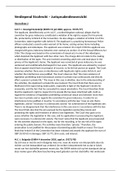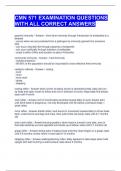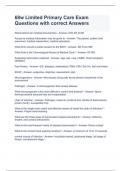Hoorcollege 2
A.D.T. t. Verenigd Koninkrijk (EHRM 31 juli 2000, appl.no. 35765/97)
The Applicant, identified only as Mr. A.D.T., a United Kingdom national, alleges that his
conviction for gross indecency constituted a violation of his right to respect for his private
life, protected by Article 8 of the Convention. He also alleges a violation of Article 14 of the
Convention, taken together with Article 8. The Applicant is a practicing homosexual. Police
officers conducted a search under warrant of his home, seizing various items including
photographs and videotapes. The applicant was arrested. On 2 April 1996 the applicant was
charged with gross indecency between men contrary to section 13 of the Sexual Offences Act
1956. The charge was based on the commission of sexual acts in one of the videotapes,
which depicted the Applicant with four other men. The charge did not relate to the making
or distribution of the tapes. The acts involved consenting adult men and took place in the
privacy of the Applicant's home. The Applicant was convicted of gross indecency. He was
sentenced and conditionally discharged for two years. The Applicant was advised by counsel
that an appeal would have no prospect of success, so he did not pursue an appeal. The Court
examines whether there was an interference with Applicants rights under Article 8, and
whether the interference was justified. The Court observes that "the mere existence of
legislation prohibiting male homosexual conduct in private may continuously and directly
affect a person's private life." The issue in this case is whether, due to the videorecording of
the activities, the Applicant's private life was involved. The Court finds that there was no
likelihood of the tapes being made public, especially in light of the Applicant's desire for
anonymity, and the fact that he concealed his sexual orientation. The Court therefore finds
that the Applicant's right to respect for his private life has been interfered with, both as
regards the existence of legislation prohibiting consensual sexual acts between more than
two men in private and as regards the conviction for gross indecency. In order for an
interference to be justified, it must be "in accordance with the law," have an aim that is
legitimate, and be "necessary in a democratic society" for achievement of the legitimate aim.
There is no disagreement that the interference in this case was in 2 accordance with the law.
The Court finds also that the aim pursued by the legislation (protecting morals and
protecting the rights and freedoms of others) was legitimate. The Court thus goes on to
assess whether the legislation in this case, and its application in prosecuting the Applicant,
were necessary in a democratic society. The Court notes that the Applicant was prosecuted
for the activities depicted on the tapes, not for the recording, or for any risk of the tapes
entering the public domain. The activities were therefore "private." Therefore, the
prosecution is not justified for the purpose of protecting public health or moral. The Court
finds that Article 8 of the Convention has been violated and awards the applicant the sum of
GBP 20,929.05 in damages, GBP 13,771.28 in costs, and interest.
M.C. t. Bulgarije (EHRM 4 december 2003, appl.nr. 39272/98)
Op zich was er met de wet in Bulgarije niets mis, maar de manier van interpretatie door de
rechter van het bestanddeel was verkeerd. De rechter interpreteerde het zo dat er fysiek
verzet van het slachtoffer geweest moest zijn. Het EHRM stelde zich op het standpunt dat op
deze manier geen effectieve bescherming werd geboden aan het slachtoffer. Het onderzoek




